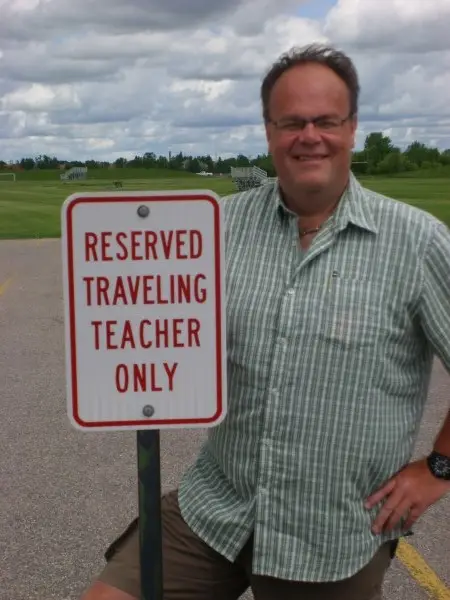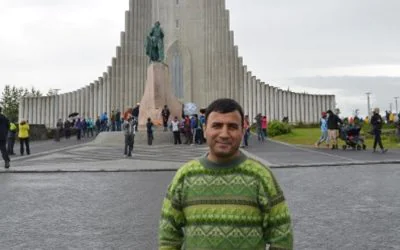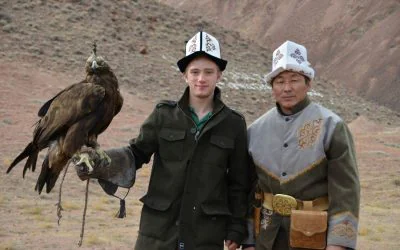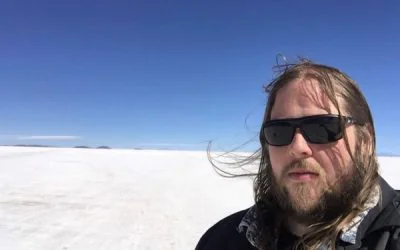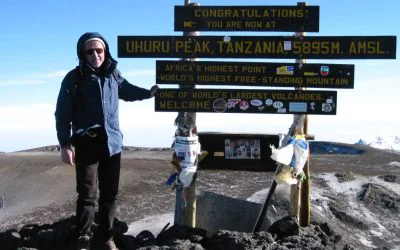Today we interview Harri Tuomola from Finland who has been an avid fan of our website from the very beginning and who is a great lover of the vast outdoors.
Harri, tell us something about your early years and how your interest in travel developed.
I have always been interested in geography and, as a kid, was a mass consumer of atlases and especially political world maps. I loved looking at them and counting the countries. As I also liked listing things, I kept coming up with new ways to list and rank the countries of the world. By the time I was ten, I probably could tell the land area, population and GDP of pretty much all nations.
However, I did not aspire reaching those countries until much later. My first independent international travel was to Geneva Auto Salon when I was 16 years old. Although as a young man, I lived long periods abroad, I didn’t have any urge to “explore” until relatively late, when I was about 25.
Besides traveling, my other great passion is driving. It was driving that gave me my first touch to what I consider traveling. When I lived in the Western USA, I frequently did long road trips, and gradually the focus of those trips started to shift from mere driving to more general travel experiences. My first non-driving overland travel was in Copper Canyon Train from Chihuahua to Los Mochis. The following year I bought a one-way ticket to Kathmandu and returned to Finland overland. I got the Soviet Union visa in Finland before I left, and by the time I was exiting Xinjiang, there was no Soviet Union anymore and I found myself in independent Kazakhstan. But the guards let me in. Ultimately that trip clinched my future, and ever since then my life has been prioritized so that traveling comes before any other commitments.
Which countries have surprised you and in what way?
Because of my work, I have visited Southern Brazil several times and every time I am surprised how much it feels like home there. Okay, maybe it is a bit of exaggeration to say that it feels Finnish, but at least has a distinct European feel to it.
A year and a half ago I did a long trip to Micronesia. The scale of those countries blows your mind. There is so little land that whereever you stand, you can always see the ocean. On the other hand, the ocean between the islands is so immense. I mean, Kiribati alone is almost as wide as the Atlantic!
I was very surprised in Colombia in 2010. I had visited the country back when it was “dark and dangerous”. Although I had heard that it had changed, I couldn’t believe how much it had changed. It had become very pleasant, safe, and easy to travel in. Across the border it was a different matter as the Venezuelan situation had deteriorated almost at the same rate that Colombian had improved.
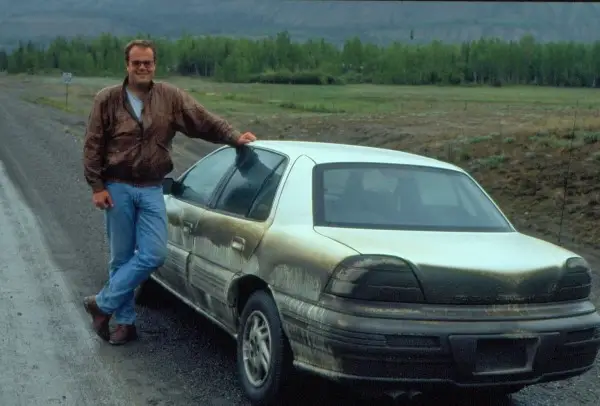
Alaska Highway, 1995
You have about 40 UN countries to finish the list – do you plan to do them all? Any ones you really look forward to?
I am not very systematic in my country collecting. I have a rather low country count considering my ranking on NomadMania’s Masterlist. As to me, traveling means long distances overland across land borders, I have some important gaps in my country list. Firstly, the countries which have closed or very difficult borders to cross. That is basically why I miss a big chunk of North-Central Africa. I have not even been to Myanmar, as its land borders were out of bounds until recently. Secondly, the countries which have no borders at all. I am not a big island hopper. Until ten years ago, I had visited hardly any islands, but in recent years I have tried to change that. But I still miss many easy ones, like Malta, for example.
But to answer the question: eventually yes, I hope to visit all the countries. But I am not in a hurry and it is not a big priority for me. The places I most look forward to are remote parts of big continents, and not so much the countries I am still missing.
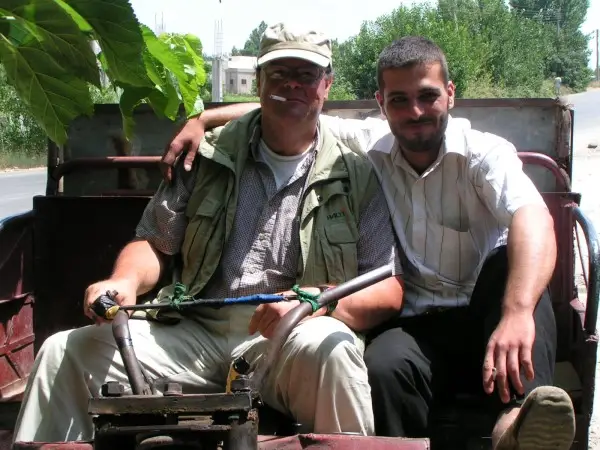
HItch-hiking in Lebanon
How do you like to travel and how do you believe that affects your impressions?
My travel is all about the love affair with roads and border crossings.
In my NomadMania profile, I have the quote from Robert Louis Stevenson: “For my part, I travel not to go anywhere, but to go. I travel for travel’s sake. The great affair is to move.” That quote has been on my wall for well over a quarter of a century and still perfectly describes my attitude towards traveling. Destination for me has never been a big deal and getting there is where all the fun is. Traveling for me means long distances and moving along. I have several trips in which I have covered over 10000 km overland and a few over 20000 km. I love driving. The next best thing is walking and hitchhiking. Then come buses and all other road vehicles which I am not steering myself. Trains are pretty nice, too. Ships I don’t care much about as sailing on a passenger ship tends to be boring. And flying I downright detest. It distorts the distances and the world view, and you end up missing all the fun parts and only get to the destination, which probably is a disappointment anyway. I fly as little as possible.
People often ask me (like all of us who travel a lot), why do I travel. For me traveling represents essentially two things: freedom and problem solving. The sense of freedom is probably more important to me than to most other people. I feel that planning reduces that sense of freedom as it makes traveling more goal-oriented and therefore less free. I rarely make advance reservations and I avoid learning much about the places I am likely to visit. Acting like this, I probably miss quite a few attractions, but those things I “discover” feel even more special. I tend to think that planning flattens the experience whereas spontaneity enhances it.
And that takes us to problem solving. When you travel without a plan, you need to stay very focused and alert. Finding your next meal and accommodation becomes a challenge, and that next border is a downright thrill. Solving those issues presents very concrete, down-to-earth problems which are the essence of traveling. And the more difficult the problems, the more interesting stories they usually make later on. Money tends to have a spoiling effect on traveling as you a bit too easily sort out the problems with it, and by doing it, kill the stories as well. Recently I mentioned in my Facebook page (www.facebook.com/htuomola) that due to my long time on the road now I have quite a cash flow problem, and one of my ex-students commented: “As if that has ever stopped you. Makes for better stories.” I really appreciated that comment as it was a good reminder to myself. Needless to say, I don’t want anyone else organizing my trips because that would take the fun part out of it.
What are three things you cannot do without when you travel?
I can do without a lot, so this is not an easy question. Passport is definitely one I need, as I so frequently cross borders. A couple of times (mainly due to illegal crossings) my passport has not been stamped, and that has led to a lot of trouble – as well as great stories. So, I learned to love and cherish my passport and treat it with respect. Though one doesn’t usually last very long before it fills up.
I think anything else is optional, but I mention one item which I like very much. Few years ago, I bought my first “travel backpack” (I don’t really know what they are called) which is a cross between a backpack and a suitcase. Even though it is a compromise, I think it is a great compromise, and I am very happy about it. I don’t know why no one came up with that idea before.
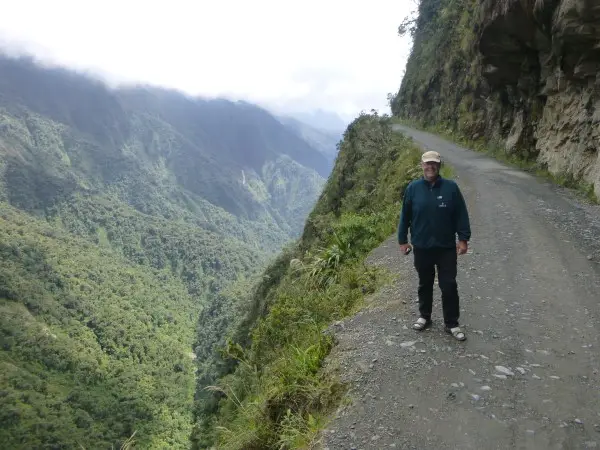
Camino de la Muerte, Bolivia
So, tell us of your illegal border crossing stories.
In 1996 the border between Thailand and Cambodia was still closed. I had made a loop from Thailand via Laos and Vietnam to Cambodia, and hated the idea of backtracking. I wanted to continue to Thailand but had no idea how to do it. In Sihanoukville, I met an American traveller who had some very detailed information on how to get from there to Trat by boats and walking. I gave it a shot. The trip was uncomfortable but his information was very accurate and in less than a day I was in Thailand but naturally without a stamp as there were no border crossing facilities. I continued to Bangkok and went to the Ministry telling that I entered the country and my passport was not stamped, so could I please get one. Once they found out that I had come from Cambodia, I was sent to the ninth floor where I had to sign various documents written in Thai. After waiting for half a day, some high ranking official comes and yells at me in Thai. A little bit later, some lower ranking official comes to yell in English, so I suppose that he was a screaming translator. I was told that I had compromised my personal as well as the national security and screwed up international relations etc. I got a huge stamp on my passport and got deported. I was told that I had 24 hours to leave the country via Bangkok airport. So no more land excursions. I took pretty much the first decently-priced flight out I was able to find and it took me to Nepal.
Pretty much the same happened in 2010 when I crossed the Darien Gap from Panama to Colombia. After the wilderness I went to the police in a small town asking for a stamp. They didn’t quite know what to do with me and always sent me to the next town. After a while I was in Medellin. There the police was not happy at all of my Darien crossing and said that I have to be fined and arrested. Fortunately I knew some people in Medellin who were able to negotiate with the police. It was finally agreed that I would stay with them in a house-arrest and just report to the police every day. Well, reporting usually took 5-6 hours each day, but at least I didn’t have to spend nights there. After six days and a sizable (but legitimate) fine, they let me go. I got a special travel permit with my picture and thumb print which made me look even more suspicious.
The third difficult situation was at Kyrgyzstan-Tajikistan border in Sary Tash Valley. Border guards gave me hell and didn’t allow me into Tajikistan. I ended up spending the night in the freezing cold border in the mountains. Eventually, with some local help, I got through but the officials refused to stamp my passport (saying that they don’t have a stamp, which might have been true). As there were no transportation, I just walked in the forest to avoid the police checkpoints. In Dushanbe I went to talk to some officials but I failed to make them understand what my problem was, and didn’t get stamped. I was to depart from Tajikistan to Afghanistan, and I was really worried what would happen at the exit when they see that I have no entry stamp. The outer rim of Commonwealth of Independent States had Russian border guards, and that was also the case with Tajikistan-Afghanistan border. The one I talked to had previously been stationed on the Russia-Finland border and he even spoke some Finnish. He was so happy to meet me there in that remote crossing that he didn’t pay any attention to my missing stamps, but just stamped me out and sent me to Afghanistan and wished good luck!
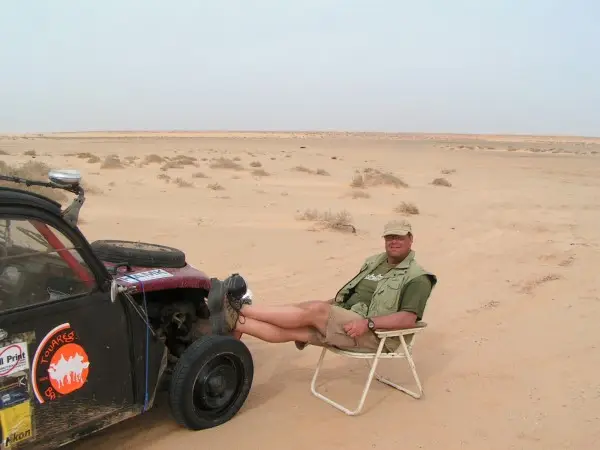
Crossing the Sahara
If you were condemned to live in one country, which one would you choose and why?
That would have to be a country with a large area and low population, so it allows traveling long distances and has remote empty corners to explore. Russia, of course, would be the ultimate choice based on this. Other alternatives could be Argentina, Mongolia, or Kazakhstan. However, in the end I would probably pick an English-speaking country, and as I prefer cold to hot, Canada wins over Australia.
Are there any downsides to travel?
No.
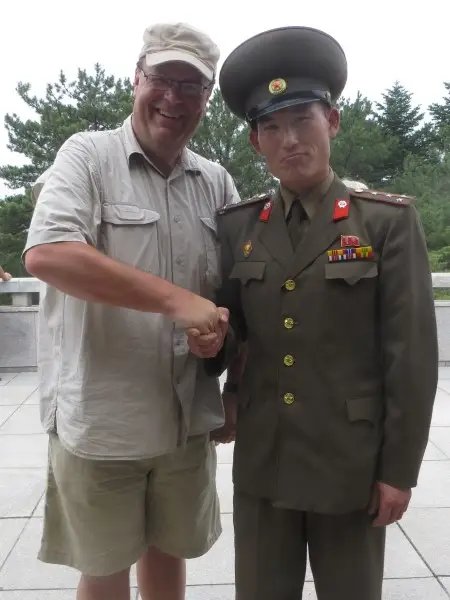
North Korea-Russia border
So what are your travel plans for the rest of the year?
I have a good year going as I have now been on the road for close to nine months straight. I first did a 20000+ km trip in South America (e.g. hitchhiked across Paraguayan Chaco – hard) and then another 5000 km from Dakar to Accra across eight West African countries. Currently I am in a work-related project in the Balkans. Once it is over, I plan to visit Belarus, as the visa liberalization continues there. I just learned that with an invitation it is now possible to cross to Hrodna area without a visa. As I have not crossed borders from Poland or Lithuania to Belarus, I hope to experience that. Later on, I probably go to West Asia (Caucasus etc.) and maybe at the end of the year to Southern Africa. However, as I already said, plans are not my thing, and I don’t do them unless absolutely mandatory.
Finally, the question we always ask – if you could invite four people to dinner from any time in human history, who would you invite any why?
I would probably invite Kimi Raikkonen and some other Finnish athletes. As I am a typical Finn in a sense that eating and talking are two separate activities, I know that Kimi and others would not bother me so we could all concentrate on having that dinner…
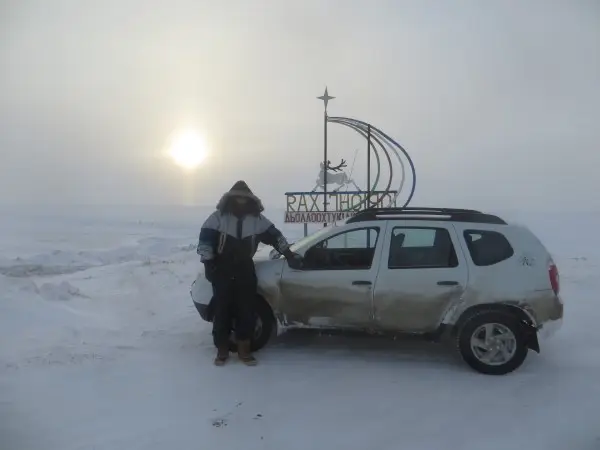
Yurung Khaya, Yakutia, Siberia
The photos in this interview are from Harri’s personal collection and we thank him for sharing them with us at NomadMania!
